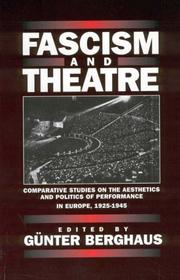| Listing 1 - 4 of 4 |
Sort by
|
Book
ISBN: 9789052603131 Year: 2008 Publisher: Amsterdam Aksant
Abstract | Keywords | Export | Availability | Bookmark
 Loading...
Loading...Choose an application
- Reference Manager
- EndNote
- RefWorks (Direct export to RefWorks)
Theatrical science --- anno 1930-1939 --- anno 1940-1949 --- Netherlands --- National socialism and theater --- Theater --- Dramatics --- Histrionics --- Professional theater --- Stage --- Theatre --- Performing arts --- Acting --- Actors --- Theater and national socialism --- History

ISBN: 1571818774 1571819010 1785330470 Year: 1996 Publisher: Providence, R.I. Berghahn
Abstract | Keywords | Export | Availability | Bookmark
 Loading...
Loading...Choose an application
- Reference Manager
- EndNote
- RefWorks (Direct export to RefWorks)
Since the 1920s, an endless flow of studies has analyzed the political systems of fascism, theseizure of power, the nature of the regimes, the atrocities committed, and, finally, the wars waged against other countries. However, much less attention has been paid to the strategies of persuasion employed by the regimes to win over the masses for their cause. Among these, fascist propaganda has traditionally been seen as the key means of influencing public opinion. Only recently has the "fascination with Fascism" become a topic of enquiry that has also formed the guiding interest of this volume: it offers, for the first time, a comparative analysis of the forms and functions of theater in countries governed by fascist or para-fascist regimes. By examining a wide spectrum of theatrical manifestations in a number of States with a varying degree of fascistization, these studies establish some of the similarities and differences between the theatrical cultures of several cultures in the interwar period.
Political philosophy. Social philosophy --- Theatrical science --- anno 1920-1929 --- anno 1930-1939 --- anno 1940-1949 --- Germany --- Italy --- Spain --- Fascism and theater --- National socialism and theater. --- History --- Theater and fascism --- Theater --- Theater and national socialism

ISBN: 1571819010 Year: 1996 Publisher: Providence (R.I.) Berghahn
Abstract | Keywords | Export | Availability | Bookmark
 Loading...
Loading...Choose an application
- Reference Manager
- EndNote
- RefWorks (Direct export to RefWorks)
82-2 --- 82:32 --- Toneel. Drama --- Literatuur en politiek --- 82:32 Literatuur en politiek --- 82-2 Toneel. Drama --- Fascism and theater --- National socialism and theater --- Theater and national socialism --- Theater --- Theater and fascism --- History --- Fascisme et théâtre --- National-socialisme et art --- National-socialisme et théâtre --- Italie --- Espagne --- France --- Allemagne --- 1900-1945
Book
ISBN: 1501739883 1501739875 9781501739873 9781501739880 9781501739859 9781501739866 1501739867 1501739859 Year: 2020 Publisher: Ithaca, NY : Cornell University Press,
Abstract | Keywords | Export | Availability | Bookmark
 Loading...
Loading...Choose an application
- Reference Manager
- EndNote
- RefWorks (Direct export to RefWorks)
Following World War II, German antifascists and nationalists in Buenos Aires believed theater was crucial to their highly politicized efforts at community-building, and each population devoted considerable resources to competing against its rival onstage. Competing Germanies tracks the paths of several stage actors from European theaters to Buenos Aires and explores how two of Argentina's most influential immigrant groups, German nationalists and antifascists (Jewish and non-Jewish), clashed on the city's stages. Covered widely in German- and Spanish-language media, theatrical performances articulated strident Nazi, antifascist, and Zionist platforms. Meanwhile, as their thespian representatives grappled onstage for political leverage among emigrants and Argentines, behind the curtain, conflicts simmered within partisan institutions and among theatergoers. Publicly they projected unity, but offstage nationalist, antifascist, and Zionist populations were rife with infighting on issues of political allegiance, cultural identity and, especially, integration with their Argentine hosts.Competing Germanies reveals interchange and even mimicry between antifascist and nationalist German cultural institutions. Furthermore, performances at both theaters also fit into contemporary invocations of diasporas, including taboos and postponements of return to the native country, connections among multiple communities, and forms of longing, memory, and (dis)identification. Sharply divergent at first glance, their shared condition as cultural institutions of emigrant populations caused the antifascist Free German Stage and the nationalist German Theater to adopt parallel tactics in community-building, intercultural relationships, and dramatic performance.Its cross-cultural, polyglot blend of German, Jewish, and Latin American studies gives Competing Germanies a wide, interdisciplinary academic appeal and offers a novel intervention in Exile studies through the lens of theater, in which both victims of Nazism and its adherents remain in focus.
German drama --- Germans --- Jewish theater --- National socialism and theater --- Ethnic theater --- Minority theater --- Minorities --- Theater --- Theater and national socialism --- Theater, Hebrew --- Theater, Jewish --- Jewish entertainers --- Ethnology --- History and criticism. --- History --- History. --- Jews --- Deutsches Theater (Buenos Aires, Argentina) --- Freie Deutsche Buehne in Buenos Aires --- Buenos Aires (Argentina). --- F.D.B. (Freie Deutsche Buehne) --- FDB (Freie Deutsche Buehne) --- FGS (Free German Stage) --- Free German Stage (Buenos Aires, Argentina) --- Freie Deutsche Bühne (Buenos Aires, Argentina) --- Teatro Alemán Independiente (Buenos Aires, Argentina) --- Théâtre allemand libre (Buenos Aires, Argentina) --- Ney-Bühne (Buenos Aires, Argentina) --- German Theater (Buenos Aires, Argentina) --- Migration studies, Buenos Aires, Gelmanistic, theater history, Free German Stage, Zionist culture.
| Listing 1 - 4 of 4 |
Sort by
|

 Search
Search Feedback
Feedback About UniCat
About UniCat  Help
Help News
News